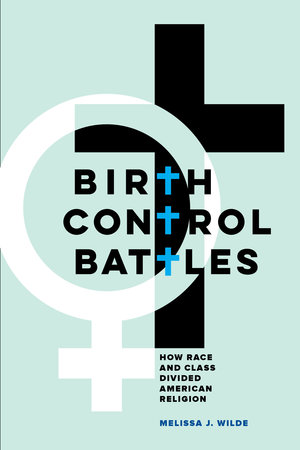by L. Nelson Leonard
Melissa J. Wilde, Birth Control Battles: How Race and Class Divided American Religion, (Oakland: University of California Press, 2020; 304 pages, $29.95)
In Birth Control Battles, Melissa Wilde offers a socio-historical analysis of how race, class, and religion converged and defined American reproductive politics. Wilde examines nine prominent religious groups (spanning thirty-one denominations) across the Depression era and through the 1960s, paying particular attention to their positions regarding birth control access and use. Wilde codes these denominations into four discrete categories: “early liberalizers”, “supporters”, “critics”, and “silent groups”. She describes “early liberalizers” as those with religious leanings who openly promoted contraception as early as the 1930s. While their support for contraception emerged out of social gospel activism, Wilde clarifies that their advocacy was also rooted in eugenics. Wilde shows that “supporters” were motivated by eugenics as well. Unlike the “early liberalizers”, “supporters” were generally ambivalent about social activism and the denominations declined to offer official positions. “Critics” rejected birth control altogether, objecting to eugenics and the social gospel. Meanwhile, the “silent groups” abstained from taking any position on birth control. In addition to mapping out the different theologies that informed these groups’ opinions on birth control, Wilde places them in a geographical context by demonstrating where they were actually located in the United States.

By looking at contraception, Birth Control Battles exposes how religion intersects inequality in important, complex ways. Wilde foregrounds religion as a core determinant in racial, ethnic, class, and gender disparities. She argues that religion is an analytical category and an essential component for determining which bodies are “desirable” or “undesirable” in relation to reproduction.
As such, Wilde demonstrates how religion preoccupied American denominational civic practices in a way that operationalized the birth control movement as a racial project. Birth Control Battles provides a compelling angle for understanding why reproductive politics divided—and continues to dominate—American religion. Wilde highlights the enduring legacies of race and class on religion by resurfacing what it has meant to be progressive or conservative in the American socio-political landscape.
Key Terms:
Race = a concept which signifies and symbolizes social conflicts and interests by referring to different types of human bodies
Racialization = the process of ascribing racial or ethnic identities to a group that did not necessarily have that identity prior to that process
Racial project = any effort to reorganize and redistribute resources along particular racial lines
L. Nelson Leonard is a PhD student in the Religion in Society track at UT Austin’s Department of Religious Studies. She has training in political science and uses her interdisciplinary methodological skills to address cultural intersections of race and religion. You can learn more about her and her work here!
